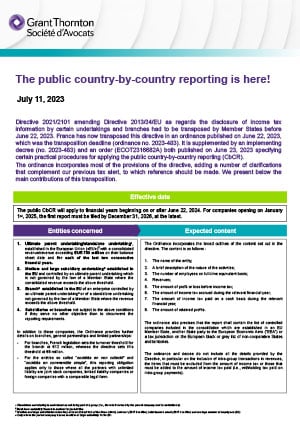-
Tax Policy Management
Tax Policy Management
-
Growth Management
Growth Management
-
Tax audit and litigation
Tax audit and litigation

-
Definition of a strategic and secure transfer pricing structure
Definition of a strategic and secure transfer pricing structure
-
Assistance in the development of international activities and operational reorganisations – “Business restructuring”
Assistance in the development of international activities and operational reorganisations – “Business restructuring”
-
Defense of practices and assistance in the context of tax audits and their follow-up from a litigation viewpoint
Defense of practices and assistance in the context of tax audits and their follow-up from a litigation viewpoint
-
Annual declaration and documentation obligations
Annual declaration and documentation obligations

-
Domestic and international VAT applicable to your company's flow
Domestic and international VAT applicable to your company's flow
-
Banking and financial VAT, VAT in the insurance sector
Banking and financial VAT, VAT in the insurance sector
-
VAT related to real estate registration fees
VAT related to real estate registration fees
-
VAT in the public and non-profit / association sector
VAT in the public and non-profit / association sector
-
Tax audit, tax litigation and relations with the Tax authorities
Tax audit, tax litigation and relations with the Tax authorities
-
Applicable rules for invoicing
Applicable rules for invoicing
-
Customs issues related to your company's international flows
Customs issues related to your company's international flows
-
French VAT registration and compliance obligations
French VAT registration and compliance obligations
-
Payroll tax
Payroll tax
-
Other indirect taxation
Other indirect taxation

-
Company transfer diagnosis
Company transfer diagnosis

-
Distribution strategy : Implementing and structuring
Distribution strategy : Implementing and structuring
-
Distribution activities digitalisation
Distribution activities digitalisation
-
Relations between suppliers and distributors
Relations between suppliers and distributors
-
Contractual policy : etablishing and structuring
Contractual policy : etablishing and structuring
-
Controls and litigation regarding payment terms
Controls and litigation regarding payment terms
-
Organising and securing commercial relations with consumers
Organising and securing commercial relations with consumers
-
Data protection - GDPR
Data protection - GDPR
-
Commercial Leases
Support in the management and contract management of commercial leases.

-
Traditional Services offered
Traditional Services offered
-
Health at work and quality of life at work
Health at work and quality of life at work
-
HR Management Audit
HR Management Audit
-
HR Engineering and People Change
Implementing managerial solutions in line with the company's strategic challenges
-
Management of HR compliance and internal investigations (harassment, discrimination, and whistleblowing)
Management of HR compliance and internal investigations (harassment, discrimination, and whistleblowing)

-
Advice on legal structuring
Advice on legal structuring
-
Day to day company management
Day to day company management
-
Companies reorganisation
Companies reorganisation
-
Mergers & Acquisitions - Private Equity
Mergers & Acquisitions - Private Equity
-
Changes in shareholder structure - Securities issue
Changes in shareholder structure - Securities issue
-
Governance and legal risks management
Governance and legal risks management

-
Development of an international mobility policy
Development of an international mobility policy
-
Coordination of reporting obligations for employees in a mobility situation
Coordination of reporting obligations for employees in a mobility situation
-
Advice on social security
Advice on social security
-
Assistance in labour law
Assistance in labour law

-
Management and protection of your portfolio of property rights
We put the most appropriate protection policy in place for our clients’ intellectual property rights.
-
Securing your projects: advisory and drafting of agreement services
We advise you on the feasibility of your project and the securing of your intellectual property and IT rights.
-
Enforcement of your rights: pre-litigation and litigation
Enforcement of your rights: detection of infringement, pre-litigation and litigation

Directive 2021/2101 amending Directive 2013/34/EU as regards the disclosure of income tax information by certain undertakings and branches had to be transposed by Member States before June 22, 2023. France has now transposed this directive in an ordinance published on June 22, 2023, which was the transposition deadline (ordinance no. 2023-483). It is supplemented by an implementing decree (no. 2023-483) and an order (ECOT2316682A) both published on June 23, 2023 specifying certain practical procedures for applying the public country-by-country reporting (CbCR).
The ordinance incorporates most of the provisions of the directive, adding a number of clarifications that complement our previous tax alert, to which reference should be made. We present below the main contributions of this transposition.
Effective date
The public CbCR will apply to financial years beginning on or after June 22, 2024. For companies opening on January 1st, 2025, the first report must be filed by December 31, 2026, at the latest.
Entities concerned
Ultimate parent undertaking/standalone undertaking1, established in the European Union («EU»)2 with a consolidated revenue/revenue exceeding EUR 750 million on their balance sheet date and for each of the last two consecutive financial years.
Medium and large subsidiary undertaking3 established in the EU and controlled by an ultimate parent undertaking which is not governed by the law of a Member State where the consolidated revenue exceeds the above threshold.
Branch4 established in the EU of an enterprise controlled by an ultimate parent undertaking4 or of a standalone undertaking not governed by the law of a Member State where the revenue exceeds the above threshold.
Subsidiaries or branches not subject to the above conditions if they serve no other objective than to circumvent the reporting requirements.
In addition to these companies, the Ordinance provides further details on branches, general partnerships and limited partnerships:
For branches, French legislation sets the turnover threshold for the branch at €12 million, whereas the directive sets this threshold at €8 million.
For the entities so called “sociétés en non collectif” and “sociétés en commandite simple”, this reporting obligation applies only to those where all the partners with unlimited liability are joint stock companies, limited liability companies or foreign companies with a comparable legal form.
Expected content
The Ordinance incorporates the broad outlines of the content set out in the directive. The content is as follows :
- The name of the entity;
- A brief description of the nature of the activities;
- The number of employees on full-time equivalent basis;
- Revenues;
- The amount of profit or loss before income tax;
- The amount of income tax accrued during the relevant financial year;
- The amount of income tax paid on a cash basis during the relevant financial year;
- The amount of retained profits.
The ordinance also precises that the report shall contain the list of controlled companies included in the consolidation which are established in an EU Member State, another State party to the European Economic Aera (“EEA”) or a tax jurisdiction on the European black or grey list of non-cooperative States and territories.
The ordinance and decree do not include all the details provided by the Directive, in particular on the inclusion of intra-group transactions in revenues, the items that must be excluded from the amount of income tax or those that must be added to the amount of income tax paid (i.e., withholding tax paid on intra-group payments).
Temporary omission
The ordinance states that sensitive information, whose disclosure would be seriously prejudicial to the commercial position of undertakings to which the report relates, may be omitted.
The omission is temporary. Information omitted must be published in a subsequent report within 5 years of the omission. The report must also specify the reasons for the omission.
However, neither the ordinance, nor the decree specify what would happen to the omitted information if the undertakings concerned no longer meet the thresholds and are therefore relieved from this obligation.
It should be noted that for companies located in countries and territories that are non-cooperative for tax purposes (Appendix I and II of the conclusions of the Council of the European Union on the revised EU list), no information may be omitted.
Declaration procedures
The decree clarifies the reporting requirements. The report, translated into French and certified as compliant, must be filed to the registry of commercial court.
The report is then made available to the public, free of charge, for at least five consecutive years on the website of the company concerned.
When the report is published on the website of a third country, it must mention the name and address of the branch, or the name and registered office of the company present in France.
Where the consolidating company and one of the controlled companies have activities which may be subject to tax on profits in the same tax jurisdiction, or where the consolidating company controls several companies included in the consolidation which have activities which may be subject to tax on profits in the same tax jurisdiction, the information relating to the activities of each of the companies concerned, including their branches, is aggregated for this jurisdiction.
Responsibilities, injunctions and penalties relating to this declaration
The statutory auditors will now have to indicate whether the company is subject to this reporting obligation and, if so, certify that the report has been published and made available to the public for the financial year preceding the one for which the accounts are certified.
The board of directors, the management board, the executive directors, the legal representative of the company in France or the person with authority to bind the company in France must ensure that the company draws up, publishes and makes available the report.
In this respect, the Ordinance introduces an injunction enabling any person to request the president of the court, ruling in chambers (“reféré”), to order the company to publish or make available the income tax report, subject to a fine if necessary.
It should be noted that neither the ordinance nor the decree provide any penalties in the event of failure to comply with this reporting obligation, even though it is up to each Member State to define them.
1. Standalone undertaking is understood as not being part of a group (i e the whole formed by the parent company and its subsidiaries)
2. Must have subsidiary/branch in another tax jurisdiction
3. Medium and large subsidiaries when they exceed at least two of the three criteria, turnover (EUR 8 million), total balance sheet (EUR 4 million) and average number of employees 50
4. Only where the parent company has no medium or large subsidiary in the EU



















